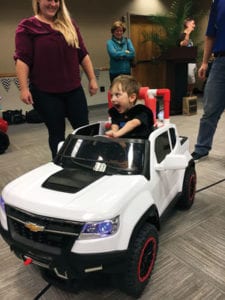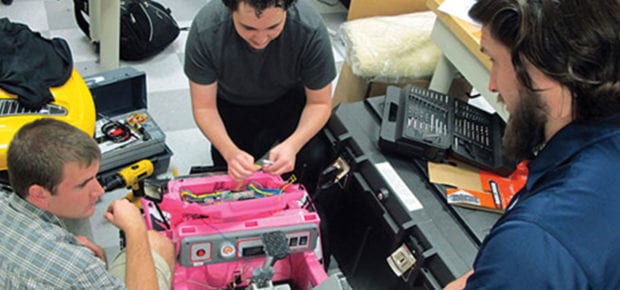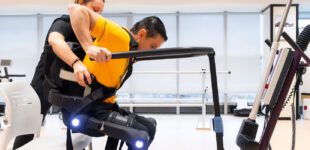October 10, 2017
 Juan Aceros, IEEE Member, Assistant Professor of Electrical Engineering, College of Computing, Engineering & Construction at the University of North Florida
Juan Aceros, IEEE Member, Assistant Professor of Electrical Engineering, College of Computing, Engineering & Construction at the University of North Florida
IEEE Transmitter: What is your area of robotics expertise?
Aceros: We work on adaptive systems for pediatric rehabilitation.
IEEE Transmitter: Why is the area of robotics with which you are involved important? How is it benefitting society today, and how will it benefit society in the future?
Aceros: The area of pediatric rehabilitation is a critical and underdeveloped scientific area. The benefits to society are directly linked to the improvement in the quality of life of children with disabilities. The work we are doing aims to provide a paradigm change in current clinical intervention guidelines and improve future independent functional prognosis, medical management, educational cost, academic success and overall quality of life for children with motor impairments. Furthermore, demonstrating the benefits of our technology during the critical periods of neural development could improve management of therapies, patient coverage and empower clinicians with objective information that leads to optimal treatments by eliminating possible detrimental effects such as irreversible cognitive and motor impairments.
IEEE Transmitter: What are the functions performed by the robots you are working with? Why is this special?
Aceros: These robots engage children in mobility-based treatments. They are based on easy to use, low cost, child and family friendly modified power ride-on toys that effectively engage children in the exploration of their environment. This is important because children with developmental motor disabilities often lack the opportunity to perform these independent explorations of their environment and consequently face developmental delays that negatively impact their overall health and well-being leading to depression, social isolation and lower quality of life.
IEEE Transmitter: What challenges did you face in teaching your robot to interact with humans?
Aceros: We are not tackling some of the harder problems of robotics, such as advanced mathematical methods for artificial intelligence, but rather we work at the interface of human and machine. Our challenges are related to humans and how they engaged with our technology. We want our humans to learn from interactions with our system and not the other way around.
IEEE Transmitter: We understand robots are starting to learn on their own. How is technology enabling robots to learn on their own?
Aceros: This is the next step in evolution for our devices. Automatic, wireless, short or long range, bi-directional data transmission will allow therapists to actively engage patients from remote locations.
IEEE Transmitter: How do you envision robots learning in the next 5-10 years?
Aceros: In the medical device industry, this will have a substantial impact. I envision unbiased monitoring of rehabilitation therapies from remote locations using these robotic assistive devices to assess and prevent some of the most prevalent diseases among the motion impaired population, such as obesity, diabetes, and heart disease, while providing clinicians with digitally supported health information and all the potential benefits associated with their electronic health records (EHR).






 MEANINGFUL MOMENTUM OR RUNNING IN PLACE?
MEANINGFUL MOMENTUM OR RUNNING IN PLACE? AI Through Our Ages
AI Through Our Ages Liquid Infrastructure: Our Planet's Most Precious Resource
Liquid Infrastructure: Our Planet's Most Precious Resource The Impact of Technology in 2025
The Impact of Technology in 2025 Quantum and AI: Safeguards or Threats to Cybersecurity?
Quantum and AI: Safeguards or Threats to Cybersecurity? Why AI Can't Live Without Us
Why AI Can't Live Without Us Bits, Bytes, Buildings and Bridges: Digital-Driven Infrastructure
Bits, Bytes, Buildings and Bridges: Digital-Driven Infrastructure Impact of Technology in 2024
Impact of Technology in 2024 Emerging AI Cybersecurity Challenges and Solutions
Emerging AI Cybersecurity Challenges and Solutions The Skies are Unlimited
The Skies are Unlimited Smart Cities 2030: How Tech is Reshaping Urbanscapes
Smart Cities 2030: How Tech is Reshaping Urbanscapes Impact of Technology 2023
Impact of Technology 2023 Cybersecurity for Life-Changing Innovations
Cybersecurity for Life-Changing Innovations Smarter Wearables Healthier Life
Smarter Wearables Healthier Life Infrastructure In Motion
Infrastructure In Motion The Impact of Tech in 2022 and Beyond
The Impact of Tech in 2022 and Beyond Cybersecurity, Technology and Protecting Our World
Cybersecurity, Technology and Protecting Our World How Technology Helps us Understand Our Health and Wellness
How Technology Helps us Understand Our Health and Wellness The Resilience of Humanity
The Resilience of Humanity Harnessing and Sustaining our Natural Resources
Harnessing and Sustaining our Natural Resources Creating Healthy Spaces Through Technology
Creating Healthy Spaces Through Technology Exceptional Infrastructure Challenges, Technology and Humanity
Exceptional Infrastructure Challenges, Technology and Humanity The Global Impact of IEEE's 802 Standards
The Global Impact of IEEE's 802 Standards Scenes of our Cyber Lives: The Security Threats and Technology Solutions Protecting Us
Scenes of our Cyber Lives: The Security Threats and Technology Solutions Protecting Us How Millennial Parents are Embracing Health and Wellness Technologies for Their Generation Alpha Kids
How Millennial Parents are Embracing Health and Wellness Technologies for Their Generation Alpha Kids Space Exploration, Technology and Our Lives
Space Exploration, Technology and Our Lives Global Innovation and the Environment
Global Innovation and the Environment How Technology, Privacy and Security are Changing Each Other (And Us)
How Technology, Privacy and Security are Changing Each Other (And Us) Find us in booth 31506, LVCC South Hall 3 and experience the Technology Moon Walk
Find us in booth 31506, LVCC South Hall 3 and experience the Technology Moon Walk Virtual and Mixed Reality
Virtual and Mixed Reality How Robots are Improving our Health
How Robots are Improving our Health IEEE Experts and the Robots They are Teaching
IEEE Experts and the Robots They are Teaching See how millennial parents around the world see AI impacting the lives of their tech-infused offspring
See how millennial parents around the world see AI impacting the lives of their tech-infused offspring Take the journey from farm to table and learn how IoT will help us reach the rising demand for food production
Take the journey from farm to table and learn how IoT will help us reach the rising demand for food production Watch technical experts discuss the latest cyber threats
Watch technical experts discuss the latest cyber threats Explore how researchers, teachers, explorers, healthcare and medical professionals use immersive technologies
Explore how researchers, teachers, explorers, healthcare and medical professionals use immersive technologies Follow the timeline to see how Generation AI will be impacted by technology
Follow the timeline to see how Generation AI will be impacted by technology Learn how your IoT data can be used by experiencing a day in a connected life
Learn how your IoT data can be used by experiencing a day in a connected life Listen to technical experts discuss the biggest security threats today
Listen to technical experts discuss the biggest security threats today See how tech has influenced and evolved with the Games
See how tech has influenced and evolved with the Games Enter our virtual home to explore the IoT (Internet of Things) technologies
Enter our virtual home to explore the IoT (Internet of Things) technologies Explore an interactive map showcasing exciting innovations in robotics
Explore an interactive map showcasing exciting innovations in robotics Interactively explore A.I. in recent Hollywood movies
Interactively explore A.I. in recent Hollywood movies Get immersed in technologies that will improve patients' lives
Get immersed in technologies that will improve patients' lives